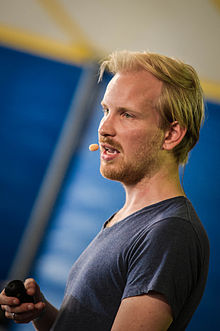Rutger C. Bregman | |
|---|---|
 Bregman in 2015 | |
| Born | 26 April 1988 |
| Nationality | Dutch |
| Education | Master of Arts in History (2010–2012) at Utrecht University and the University of California[1] |
| Occupation | Journalist and author |
| Known for | Basic income, working hours and open borders |
Notable work | Utopia for Realists: How We Can Build the Ideal World |
| Spouse(s) | Maartje ter Horst |
Rutger C. Bregman (born 26 April 1988) is a Dutch popular historian and author. He has published four books on history, philosophy, and economics, including Utopia for Realists: How We Can Build the Ideal World 2016, which has been translated into thirty-two languages. His work has been featured in The Washington Post, The Guardian and the BBC. He has been described by The Guardian as the "Dutch wunderkind of new ideas"[2] and by TED Talks as "one of Europe's most prominent young thinkers".[3] His TED Talk, "Poverty Isn't a Lack of Character; It's a Lack of Cash", was chosen by TED curator Chris Anderson as one of the top ten of 2017.[4]
Books[edit]
Utopia for Realists[edit]
Utopia for Realists: How We Can Build the Ideal World[13] promotes a more productive and equitable life based on three core ideas which include a universal and unconditional basic income paid to everybody, a short workweek of fifteen hours, and open borders worldwide with the free exchange of citizens between all nations.[14] It was originally written as articles in Dutch for the online journal De Correspondent.[15]
In an interview with the Montreal newspaper Le Devoir in September 2017, Bregman said that "to move forward, a society needs dreams, not nightmares. Yet people are caught in the logic of fear. Whether it is Trump, Brexit or the last elections in Germany, they vote against the future and instead for solutions to replace it, believing the past was better based on a thoroughly mistaken view of the world: the world was worse before … Humanity is improving, conditions of life, work and health too. And it's time to open the windows of our minds to see it."[16]
Utopia for Realists: The Case for a Universal Basic Income, Open Borders, and a 15-hour Workweek (alternatively subtitled And How We Can Get There and How We Can Build the Ideal World) is a book by Dutch popular historian Rutger Bregman.[1] It was originally written as articles in Dutch for a virtual journal, De Correspondent and was since compiled and published,[2] and translated into several languages. It offers a critical proposal that it claims is a practical approach to reconstructing modern society to promote a more productive and equitable life based on three core ideas:
- a universal and unconditional basic income paid to everybody
- a short working week of fifteen hours
- open borders worldwide with the free movement of citizens between all states
Other books[edit]
Prior to the release of Utopia for Realists, Bregman had already published several books, including History of Progress, for which he was awarded the Belgian Liberales prize for best nonfiction book of 2013.[9][10][11]
In 2020, Bregman published Humankind: A Hopeful History, where he argues that humans are fundamentally mostly decent, and that more recognition of this view would likely be beneficial to everyone, partly as it would reduce excessive cynicism. For example, if society was less adamant on the view that humans are naturally lazy, there would be less reason to oppose the widespread introduction of poverty mitigation measures like basic income. The book takes a multi-disciplinary approach, drawing from the findings of history, economics, psychology, biology, anthropology and archaeology. Bregman's arguments include the assertion that in the state of nature debate, Rousseau, rather than Hobbes, was more correct about humanity's essential goodness.[17][18] [19]
與FT共進午餐:羅格斯•布雷格曼
這位荷蘭知識分子曾因直率之言激怒了達沃斯的精英們。他相信多數人的本性是利他與合作,而這往往會在危機中體現出來。
更新於2020年9月10日04:03 英國《金融時報》西蒙•庫柏
“我這兒什麼都齊了,”羅格斯•布雷格曼(Rutger Bregman)大聲說道。他依次拿起每件物品。“黃油!最重要的成分:花生醬。奶酪——生物奶酪。來自Michel的麵包,Michel是古老的豪騰村的'真正麵包房'。”他聞了聞:“真香。”
這一幕彰顯出荷蘭人的節制。32歲的布雷格曼頭髮稀疏,而且有著新冠時代的亂糟糟特點,他身穿T恤和羊毛衫,他和妻子住在烏得勒支(Utrecht)以南的小鎮豪騰(Houten),房子顯得很樸素。你看不出他是一位通過暢銷書和熱門視頻傳播進步思想的全球公知。身在巴黎的我,朝他揮了揮我手中的穀物長棍麵包和荷蘭豪達奶酪(Gouda)。
沒有留言:
張貼留言